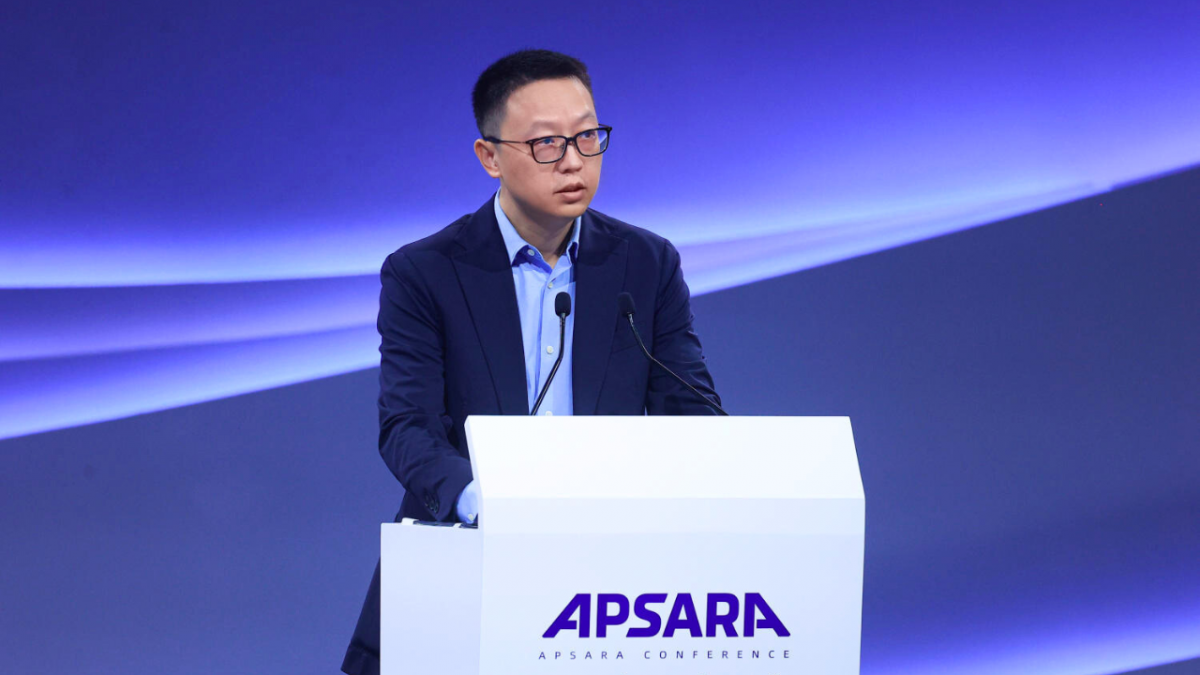
Alibaba Cloud Chief Technology Officer Zhou Jingren released the Qwen2.5 open source model at the Apsara Conference on Thursday. Photo credit: Alibaba Group
Alibaba Cloud released its latest large language model Qwen2.5 during the company’s annual flagship event Apsara in Hangzhou on Thursday.
The new model has significantly more knowledge and greatly improved coding and mathematics capabilities, and is better at instruction following, long text generation, understanding structured data and generating structured outputs.
Additionally, Alibaba Cloud is advancing its Tongyi large model family with a new text-to-video model, and an enhanced large vision language model.
“This initiative is set to empower developers and corporations of all sizes, enhancing their ability to leverage AI technologies and further stimulating the growth of the open-source community,” Jingren Zhou, Chief Technology Officer of Alibaba Cloud Intelligence, said at Apsara.
Between Sept. 19 and 21, the Hangzhou-based event will host some 400 forums with 342 hours of content on artificial intelligence, cloud computing technologies, and industry practices.
A recent McKinsey Global Survey on AI revealed a dramatic increase in adoption, with 65% of organizations now regularly use generative AI—almost double the figure from the previous year.
“Over the past year, the development of generative AI has accelerated rapidly worldwide. Every market is actively exploring the practical applications of large models,” said Eddie Wu, Chairman and Chief Executive Officer of Alibaba Cloud Intelligence, during an opening speech at the conference.
Extensive Open-source Model Offerings
Qwen2.5 offers over 100 models, comprising base, instruct, and quantized models of various precision levels and methods across multiple modalities, including language, audio, vision, and specialized code and mathematical models.
Since their introduction in April 2023, the Qwen models have been downloaded over 40 million times on open-source platforms like Hugging Face and ModelScope, while also inspiring the creation of over 50,000 models based on Qwen.

On the first day of Apsara, Alibaba Cloud also unveiled an upgraded Qwen-max model, demonstrating performance on par with other state-of-the-art models in language comprehension, reasoning, and coding.
Wu noted that the threshold for building the world’s advanced models and staying competitive will reach billions or even tens of billions of U.S. dollars.
“The path for AI to possess creative abilities and help humans solve complex problems is clear, unlocking the potential for AI’s broad application across various industries and scenarios,” he added.
Expanding the Frontiers of Multimodal Capabilities
In addition to the extensive range of language models, Alibaba Cloud is further pushing the boundaries of multimodal capabilities with a new text-to-video model launch, enhancements to its vision language model, and the introduction of the AI Developer application.
Alibaba Cloud introduced an innovative text-to-video model as part of its Wanxiang large model family, capable of producing high-quality videos in various visual styles, transforming static images into dynamic content driven by both Chinese and English text prompts.
Enhancements were also revealed for Alibaba Cloud’s vision language model, Qwen2-VL, which can now comprehend videos exceeding 20 minutes and support video-based question-answering.
This model is designed for seamless integration into mobile devices, automobiles, and robotics, facilitating various automated operations.
In the software development arena, Alibaba Cloud introduced an AI Developer, a Qwen-powered assistant that can automate tasks such as requirement analysis, coding, and debugging, allowing developers to focus on core responsibilities and skill development.

Comprehensive AI Infrastructure Enhancement
To enhance its offerings, Alibaba Cloud announced significant upgrades to its AI infrastructure services, focusing on advancements in data center architecture, data management, and model training and reasoning.
“Alibaba Cloud is investing, with unprecedented intensity, in the research and development of AI technology and the building of its global infrastructure. We aim to establish an AI infrastructure of the future to serve our global customers and unlock their business potential,” said Wu.
These improvements aim to optimize operational efficiency and reduce deployment times while maximizing data utility for generative AI applications.
Additionally, updates emphasize optimizing resource management and governance, enabling organizations to effectively harness their data and computing power.
Overall, the upgraded infrastructure provides a robust platform for developing efficient, sustainable, and inclusive AI applications, empowering customers and partners to leverage cutting-edge technological advancements.




